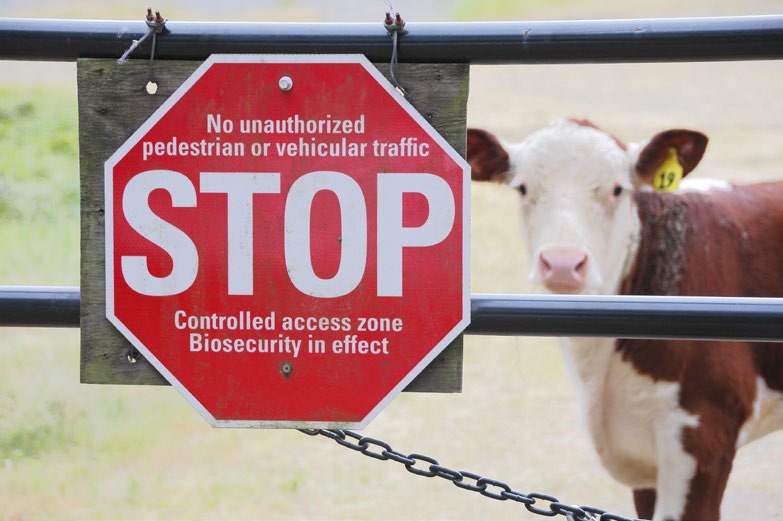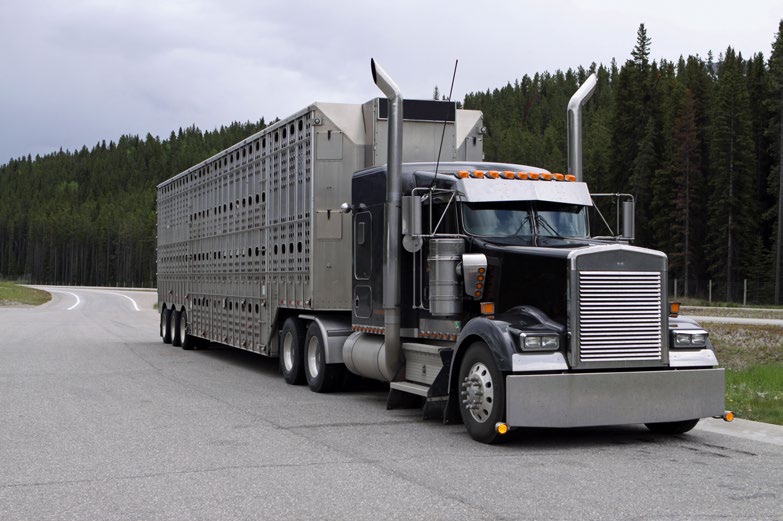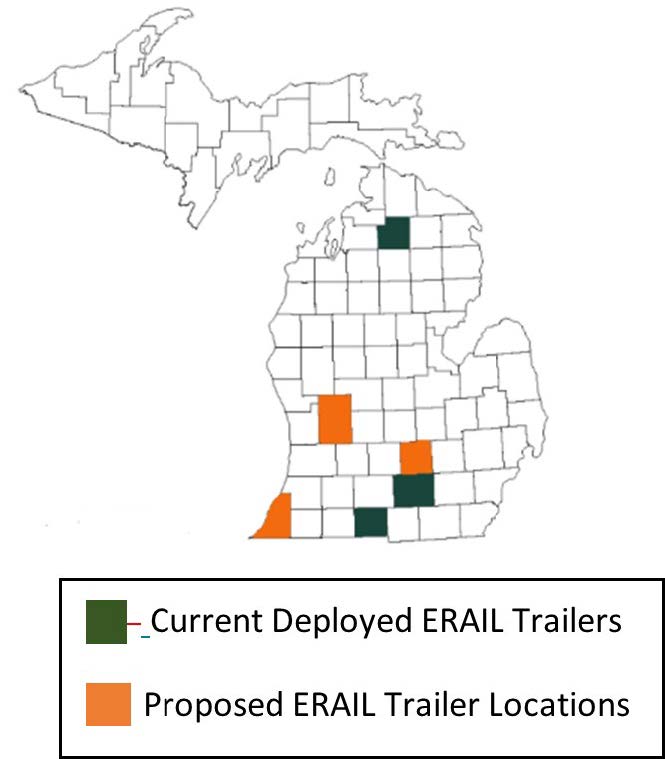
Industry Collaborations Led by MSU Extension Focus on Preparedness for Michigan's Animal Agriculture Industry
DOWNLOADMay 12, 2022 - MSU Extension
Impacts
With contributions of more than $104.7 billion annually to our state’s economy,² agriculture is one of Michigan’s most important and productive industries. Michigan farmers manage their operation with innovative systems and work daily to mitigate risks present in the agriculture industry. The collaborative efforts of industry organizations, including Michigan State University (MSU) Extension, MSU Veterinary Diagnostic Laboratory, the Michigan Pork Producers Association (MPPA), the Michigan Department of Agriculture and Rural Development (MDARD) and various county services, has created opportunities for various programs and systems that positively influence the business continuity of these operations by focusing on preparedness for Michigan’s animal agriculture industry.
- 52.1 Billion pounds of meat produced by the livestock industry in the U.S.¹
- Millions of animals transported across the U.S.
- 805,000 jobs related to the food and animal agriculture industry in Michigan²
- By providing leadership for Michigan’s preparedness efforts, MSU Extension focuses on finding solutions for high-risk issues that affect the animal agriculture industry.
- MSU Extension’s Emergency Response to Accidents Involving Livestock programs focus on the safety of law enforcement officers, first responders and the public traveling Michigan roads and highways.
- By assisting farmers with completing preparedness efforts, MSU Extension works to avoid supply chain disruption for processing units during the threat of a foreign animal disease outbreak.
For More Information:

Beth Ferry, MSU Extension pork educator,
269-876-2745, franzeli@msu.edu
Sarah Fronczak, MSU Extension
environmental management educator,
517-439-9301, froncza3@msu.edu

Charles Gould, MSU Extension
bioenergy educator,
616-834-2812, gouldm@msu.edu
Industry Organizations Continue to Work Toward Preparedness for Foreign Animal Disease Outbreaks
As pork producers deal with challenges common to agriculture such as labor shortages, increasing input costs and common production diseases, they are also keeping a watchful eye on African swine fever (ASF), a devastating disease spreading through China, Eastern European countries and the Dominican Republic. While not currently present in the U.S., this disease remains on the radar of producers for a multitude of reasons.
ASF is a production disease that will devastate a swine herd, resulting in infected animals having extremely high rates of mortality and surviving animals becoming carriers of the infectious disease. Herds that have contracted this disease are fully depopulated. Surrounding potentially susceptible farms are put under high levels of scrutiny to stamp out the disease and control the spread.
As outbreaks occur in other countries, international demand increases for U.S. pork products, adding market value to Michigan-grown pigs. While increased demand generally means increased revenue, it can also cause market price fluctuations that can be difficult for producers to manage, enticing farms to expand to meet export demand. As infected countries recover from the disease, the export markets will likely disappear, causing lower market prices.
The 2021 ASF outbreak in the Dominican Republic brought the disease much closer to home. Producers, processing facilities and associated businesses understand there is no longer an ocean between their industry and this disease. The implications of an outbreak in the U.S. are vast and would result in an immediate shut down of all export markets for the swine industry. Recent research from Iowa State University and Universidad de la Republica, Uruguay, (https://www.frontiersin.org/articles/10.3389/ fvets.2021.686038/full) indicates “the costs associated with an ASF outbreak are significant and require risk mitigation and safeguards to protect against the importation of the disease.” ²
African Swine Fever (ASF)
Is Everyone's Responsibility
Early detection and quick action by people working with pigs every day are important weapons in stopping the spread of the disease. Meat processors are a critical link in the communication chain to farmers, customers and regulatory agencies about foreign animal disease.
What To Do If You See Signs of ASF
- Save all identification of the suspect animal. This includes notched ear, tags, backtags, etc.
- Separate and refrigerate the internal organs from suspect animals into a plastic bin or bag.
- Isolate the carcass from others in the cooler.
-
Immediately call the Michigan Department of Agriculture and Rural Development at (800)292-3939 8:00AM-5:00PM Monday through Friday. Outside of regular business hours, call (517)373-0440.
With your help, we can stop ASF in its tracks and protect your business and the U.S. swine industry.
If there is an ASF outbreak, stopping the spread quickly will be critical. This would allow the industry to regain export markets before downsizing occurs, saving up to $35 billion in losses. There is also an expectation of an industrywide movement shutdown when the first outbreak case occurs in the U.S., posing numerous challenges from farm to table for the pork industry. If outbreaks of disease do occur, the industry will be imposed with regulations for the movement of all swine, with state departments tasked with balancing decisions that affect disease spread and business continuity.
$35 Billion |
in potential savings for the swine industry if preparedness steps for foreign animal disease are taken by farmers.³ |
26.9 % |
of the total U.S. pork production was exported in 2019.³ |
5.89 Billion |
pounds of U.S. pork export sales in 2019.³ |
“Prepare for the worst and hope for the best” is the motto the secure pork supply taskforce is taking as they focus on preparedness for the industry. The combined industry organizations of MSU Extension, MSU Veterinary Diagnostic Laboratory, MPPA and MDARD are formulating a system that allows for business continuity for Michigan’s pork producers while avoiding supply chain disruption for processing units during the threat of a foreign animal disease outbreak.
The secure pork supply (SPS) taskforce recognizes these challenges for Michigan’s prominent pork industry and has increased their efforts for the state to be fully prepared if an event would occur. The benefit of this combined industry taskforce provides a full perspective of how an outbreak would affect Michigan’s pork industry. Engaging and embracing the co-leadership of MSU Extension – an organization with direct connections to pork producers, a full understanding of Michigan’s diverse pork industry and vast knowledge of disease spread and herd health – has enhanced the efforts of the entire team and made accessible numerous outreach channels and methods supporting these preparedness efforts.
The taskforce has focused on determining enhanced biosecurity practices for farms to implement if regulations are imposed for moving swine across and into the state. The designated system will allow producers to have their enhanced biosecurity plan validated and on file for review if permitted movement is in place. By understanding and implementing these enhanced protocols, farms will be better positioned to gain access to movement permits in a timely manner. Engaging in these practices will also help producers protect their herds from disease spread, decreasing the likelihood that their farms will be infected with ASF.
Michigan’s diverse pork industry has operations varying in size and type across the state. MSU Extension provides education and resources focusing on foreign animal disease information and identification and improving biosecurity practices by using a multipronged approach to reach Michigan’s pork producers. Various efforts include providing written materials and information, engaging in one-on-one discussion with farmers, presenting materials in large group meeting settings and developing virtual training tools that allow farmers and those involved in the industry to access information in a timeframe that meets their individual needs. As additional preparedness steps are determined by the state and secure pork supply taskforce, MSU Extension will continue to provide the outreach and education needed by the pork industry to ensure Michigan pork producers are prepared for the challenges associated with a foreign animal disease outbreak.
Reducing the spread of disease means identification must happen rapidly and everyone involved in the care, transportation and processing of pigs needs to know the signs to look for and where to report their observations. Education and training materials developed by a team of MSU Extension educators and specialists are available to assist with identifying the signs of this disease. Farm laborers and personnel who access farm sites regularly, those involved in transportation of pigs and people working in processing facilities now have access to resources and information that will help them quickly identify and report any suspect animal that they may observe. This effort is crucial to quickly controlling the spread and stamping out the disease if an infection happens in Michigan or other areas of the U.S.
The efforts of the secure pork supply taskforce fully enhance the preparedness of Michigan’s pork industry. By engaging in educational activities, formulating enhanced biosecurity plans implemented on farms, routinely submitting data to support a high health herd status, and understanding how to quickly identify and report a suspect animal for foreign animal disease, Michigan’s pork industry will be fully equipped to respond to a disease outbreak and focused on maintaining the business continuity of the industry while also setting a standard for all animal agriculture production Michigan as they also work toward building secure food supply systems.
$53.51 per head |
is the export value returned to farmers.³ |
"Biosecurity on hog farms has been a work in progress for many years, but when African swine fever broke in China in 2018 and the Dominican Republic last year, it has risen to one of our top priorities. MSU Extension provides farmers the assistance they need in compiling the necessary information to create, verify and submit their enhanced biosecurity plans so they can resume business continuity during a foreign animal disease." -Mary Kelpinski, CEO, Michigan Pork Producers Association
MSU Extension's ERAIL Team Deploys Emergency Response Equipment Trailers to Assist First Responders with Managing Accidents Involving Animals
The Emergency Response to Accidents Involving Livestock (ERAIL) program is a comprehensive training and response program spearheaded by MSU Extension. This program serves Michigan’s animal agriculture industry by providing resources to assist in the response to an accident that involves livestock. The ERAIL program trains first responders (often volunteer firefighters and law enforcement officers), animal haulers and other local stakeholders on how to properly respond when animals are involved in a traffic accident, provides access to equipment that will aid in the accident response and creates a network of trained responders throughout the state.
A key goal of the ERAIL project is to provide first responders across the state with access to the tools and equipment needed to properly respond to an accident involving livestock. ERAIL response trailers are cargo trailers fully stocked with equipment and supplies that may be needed when responding. Accidents of this type typically require specialized equipment not normally carried in first responder vehicles. By locating these trailers in areas of the state that typically see high levels of animal movement and are close to major highways, those responding to accidents are better able to access the type of equipment needed to make an effective and efficient response.

Along with providing accessibility to these needed resources, the ERAIL team provides training on forming local teams, proper use of equipment included in the trailers and safety tips for first responders including information on animal behavior and animal handling.
While the ERAIL response trailers have been designed primarily to aid in the response to traffic accidents, these resources are suitable for many different situations involving animals. First responders, law enforcement officials and animal control officers are encouraged to access these tools so that a proper response can be implemented, no matter what type of animal-related event requires their help.
"I wanted to express how much I appreciate all of the work the MSU Extension team has done for the ERAIL program in Jackson County. Prior to you reaching out to me, we didn’t have resources like this within our area. Your efforts and hard work provided useful resources that will help our first responders and will provide life safety measures for both the livestock and our citizens during an actual event." -Jason Breining, Director, P.E.M Jackson County Office of Emergency Management & Homeland Security
The ERAIL program currently has three trailers fully stocked and deployed in Michigan, located in Branch, Jackson and Otsego counties. The program aims to help deploy at least six to seven ERAIL response trailers across Michigan, allowing for multiple counties, through mutual aid agreements, to have access to a nearby ERAIL response trailer. MSU Extension has determined that trailers should be located strategically so that response times should be no more than 30 to 45 minutes after contact. The MSU Extension ERAIL team is making multiple efforts to build partnership agreements between counties located adjacent to the trailer location, allowing for counties to work together using this shared resource to provide an effective and efficient response.
42 MI Counties |
and seven other states were represented by trainees participating in the ERAIL program. |

Additionally, the ERAIL team provides first responders, law enforcement officials and animal control officers in the close vicinity of the established trailer with training designed specifically to educate participants on the equipment and resources housed in the ERAIL response trailers. Thus, recent training participants included people from Branch, Jackson and Otsego counties and the surrounding areas. Participants learned to use the specific equipment and to identify creative ways to use it. They also worked through typical situations that happen when responding to accidents involving animals. Following the training, 100% of the participants indicated that they gained knowledge on deploying the trailer dedicated to their specific county, and 100% also gained knowledge on using the equipment that is available to them.
MSU Extension will continue to provide training opportunities and resources in this area, providing access to essential equipment required to mount an effective response and creating an organized network of trained responders throughout the state. This will help minimize the risks associated with these events for those involved in the response as well as minimize the economic and animal welfare risks facing the animal agriculture industry when these types of events occur.
"Without your innovative ideas, networking and persistence, this project may not have happened. You identified a need and created a way to close the gap. Without a doubt, this project set a benchmark for other communities to follow" -Jason Breining, Director, P.E.M Jackson County Office of Emergency Management & Homeland Security
91% |
of participants increased their skill set |
95.5% |
of participants plan to provide this |
100% |
of participants gained knowledge |
100% |
of participants gained knowledge on |
Resources
¹ North American Meat Institute. (2017). The United States meat industry at a glance. https://www.meatinstitute.org/ index.php?ht=d/sp/i/47465/pid/47465
² Michigan.gov. (n.d.). Facts about Michigan agriculture. https://www.michigan.gov/mdard/ about/mi-agriculture/michigan-agriculture-resources#:~:text=Economy,economic%20impact%20of%20 %245.12%20billion
³ Carriquiry, M., Elobeid, A., Swenson, D., & Hayes, D. (2020.). Economic study: Impact of the introduction of African Swine Fever in the United States. https://www. frontiersin.org/articles/10.3389/fvets.2021.686038/full



 Print
Print Email
Email




